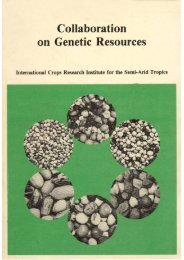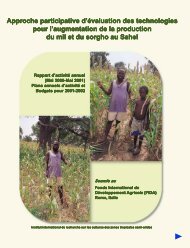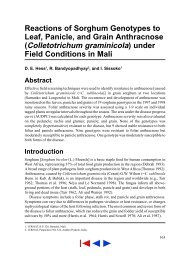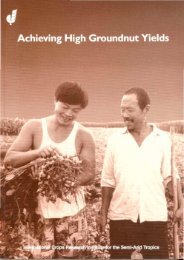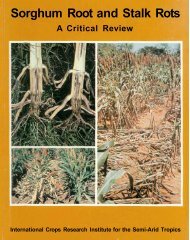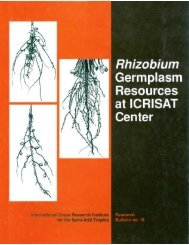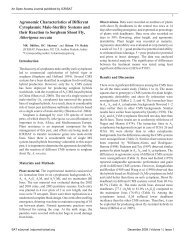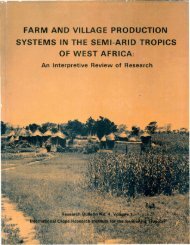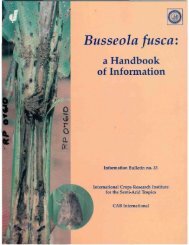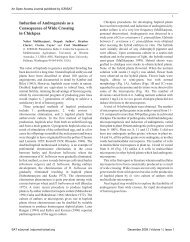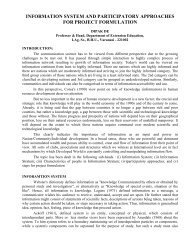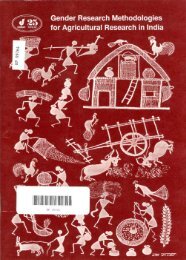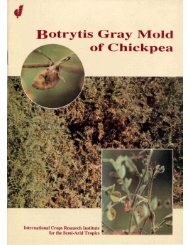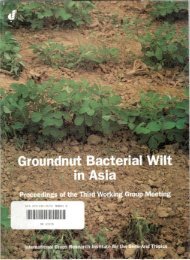RA 00183.pdf - OAR@ICRISAT
RA 00183.pdf - OAR@ICRISAT
RA 00183.pdf - OAR@ICRISAT
You also want an ePaper? Increase the reach of your titles
YUMPU automatically turns print PDFs into web optimized ePapers that Google loves.
The Peanut C R S P in West Africa<br />
D.G. Cummins 1<br />
T h e Peanut Collaborative Research Support Program (CRSP) is supported by Grant<br />
DAN-4048-G-00-0041-00 from the United States Agency for International Development. The<br />
program is managed by the University of Georgia. Participating institutions in the United<br />
States are Alabama A & M University, the University of Georgia, North Carolina State University,<br />
and Texas A & M University, which collaborate with institutions in West Africa, Southeast<br />
Asia, and the Caribbean.<br />
The goals of the Peanut CRSP are to enhance the research capability of both developing<br />
countries and the United States and focus this capability to alleviate major constraints that<br />
limit sustainable groundnut production and food delivery in an environmentally sound system.<br />
The Peanut CRSP enhances the potential of groundnut as a crop for human food and animal<br />
feed in host countries and the United States, while contributing to the increase of rural<br />
incomes.<br />
The CRSP concept requires that the subjects addressed have a global impact. Groundnut<br />
fits into this global concept as a result of the worldwide distribution of the crop, its importance<br />
in both developing and developed countries, marked similarity of production and utilization<br />
constraints worldwide. Among the other important factors are the potential for research to<br />
relieve its production and utilization constraints and enable it to contribute to an increased<br />
food supply in countries where total food and protein supply is marginal. The synergistic<br />
effect of international cooperation among groups such as ICRISAT and IRHO in groundnut<br />
research also add to its global scope. The Peanut CRSP is active in three major world<br />
regions—West Africa, Southeast Asia, and the Caribbean—based on constraints to groundnut<br />
production and utilization in those regions. Research conducted by Peanut CRSP has<br />
impact also on the United States producer and consumer.<br />
West Africa<br />
The Peanut CRSP is concentrating its Africa program on the Sahelian Region of West Africa.<br />
The Region has severe constraints to crop production dominated by a short rainy season that<br />
is broken by intermittent periods of drought. The drought problems are compounded by<br />
disease and insect pressures, and aflatoxin contamination. These constraints and problems<br />
make sustainable production difficult, which in turn creates problems in maintaining a sustaihable<br />
and adequate supply of food for a growing population.<br />
Constraints to production and food delivery in West Africa that have been identified for<br />
study under the collaborative mode of the Peanut CRSP are: low yields because cultivars<br />
1. Program Director, Peanut CRSP, University of Georgia, Griffin, GA 30 223-1797, USA.<br />
Citation: ICRISAT (International Crops Research Institute for the Semi-Arid Tropics). 1991. Summary Proceedings of<br />
the Second ICRISAT Regional Groundnut Meeting for West Africa, 11-14 Sep 1990, ICRISAT Sahelian Center,<br />
Niamey, Niger. Patancheru, A.P. 502 324, India: ICRISAT.<br />
50



